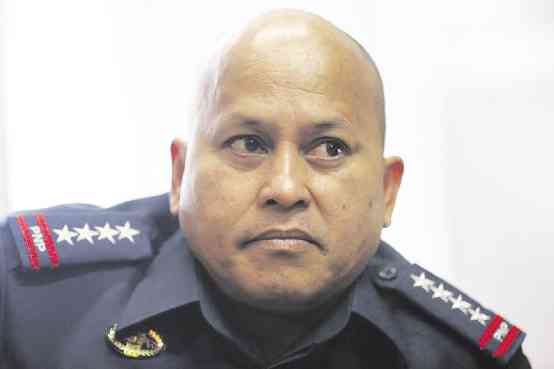Senate summons Bato

THE ROCK PNP Director General Ronald “Bato” dela Rosa will take the THE ROCK PNP Director General Ronald “Bato” dela Rosa will take the hot seat on Aug. 22-23 during the Senate inquiry into extrajudicial killings in President Duterte’s war on drugs. NIÑO JESUS ORBETA
Ronald “Bato” dela Rosa is unfazed and will enter the lion’s den once summoned.
The chief of the Philippine National Police is set to be called to a hearing of the Senate committee on justice and human rights on Aug. 22-23 on the spate of alleged extrajudicial killings in President Duterte’s war on illegal drugs.
“Yes, we will face it,” Dela Rosa said on Thursday in an interview with reporters in General Santos City. “It’s part of our job, if we will be required to attend.”
Sen. Leila de Lima, the committee chair, said other PNP officials, Commission on Human Rights officials and witnesses would be invited to the hearing on the relentless campaign of the administration that has claimed more than 700 lives.
“We will accord them due respect,” said De Lima, a vocal critic of Mr. Duterte’s campaign against illegal drugs.
Article continues after this advertisement“We have to determine the facts. We have to know the truth. We have to find out exactly why this is happening, find out how many have been killed in the course of this intensified drive against drugs,” De Lima said, adding that both deaths in police operations and vigilante-linked incidents would be investigated.
Article continues after this advertisementThe inquiry aims to draw up legislation that would institutionalize respect for human rights in the conduct of police operations, said De Lima.
The PNP put the toll of lives at 449 at the weekend from police operations against drug dealers since Mr. Duterte took office. An Inquirer count places the death toll at 711 from July 1 to Aug. 9, including 242 cases attributed to vigilantes.
Timing questioned
Sen. Alan Peter Cayetano, who is not a member of the committee but attended the closed-door meeting on Thursday morning, expressed concern at the timing of the hearing.
“There are so many things that the police need, the judges and prosecution services need toward a successful antidrug campaign. Why should we do the investigating first?” said Cayetano, Duterte’s running mate in the May 9 elections.
“We can look at the Whistle-blowers Act first, the [restoration of the] death penalty, strengthening the courts,” he said.
Misgivings
Sen. Panfilo Lacson, chair of the committee on public order and dangerous drugs, said: “I am attending the hearings if only to focus on the summary killings perpetrated by nonpolice personnel. But I have misgivings about indicting the police organization, that they are involved in summary killings. But let’s find out, let’s see how things develop during the hearing.”
Lacson earlier expressed apprehension about the De Lima-led inquiry premised on allegations of police overkill, citing his experience going through lengthy court proceedings for the alleged use of excessive force in the death of 11 members of the Kuratong Baleleng crime syndicate in 1995.
Lacson, a former PNP chief, was cleared of the charges for lack of probable cause in 2013, with the Supreme Court ruling on the case with finality.
Presidential spokesperson Ernesto Abella on Thursday defended the antidrug campaign mounted by Mr. Duterte, who was elected on a platform that centered on eliminating the drug menace, criminality and corruption in three to six months of his presidency.
Abella said the President had “never ordered extrajudicial killings.”
“He is deeply concerned about what’s happening,” Abella told a news conference in Malacañang.
He said Mr. Duterte had ordered the PNP and the National Police Commission to look into allegations of summary executions of drug suspects.
1.3 million drug users
The public, he added, should be thankful to the President for presenting the country’s drug problem, which, according to the Dangerous Drugs Board, had affected 99 percent of barangays in Metropolitan Manila and 27 percent of the nation’s 42,000 barangays. The board said 1.3 million Filipinos were using illegal drugs.
Abella defended what critics called the President’s “name and shame” campaign when he released on Sunday the names of 159 officials, judges, soldiers and policemen allegedly involved in the narcotics trade.
“I think we should appreciate the fact that he is calling our attention to it,” he said. “It’s not, by the way, (making) accusations. It’s an ample warning that your name is on the list and for you to clear (your name).”
In a statement yesterday, the Integrated Bar of the Philippines urged the administration to submit to the Supreme Court complaints against judges allegedly involved in illegal drugs.
“The President, as head of the executive department, may have been impelled by urgent considerations in his public censure of government officials under him, but on the other hand, judges perform unique functions so essential in the dispensation of justice that require insulation or protection from all types of unwarranted pressure,” said IBP president Rosario Setias-Reyes.